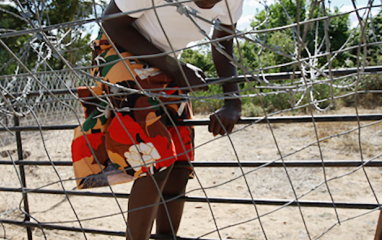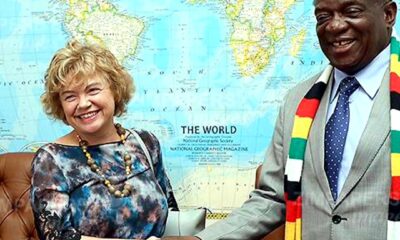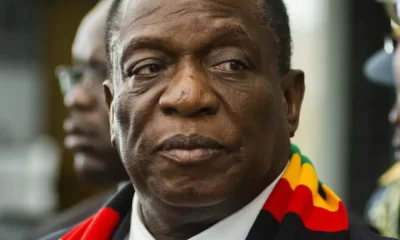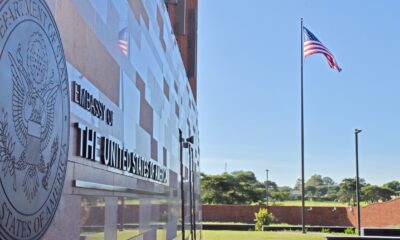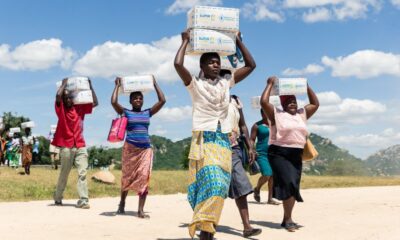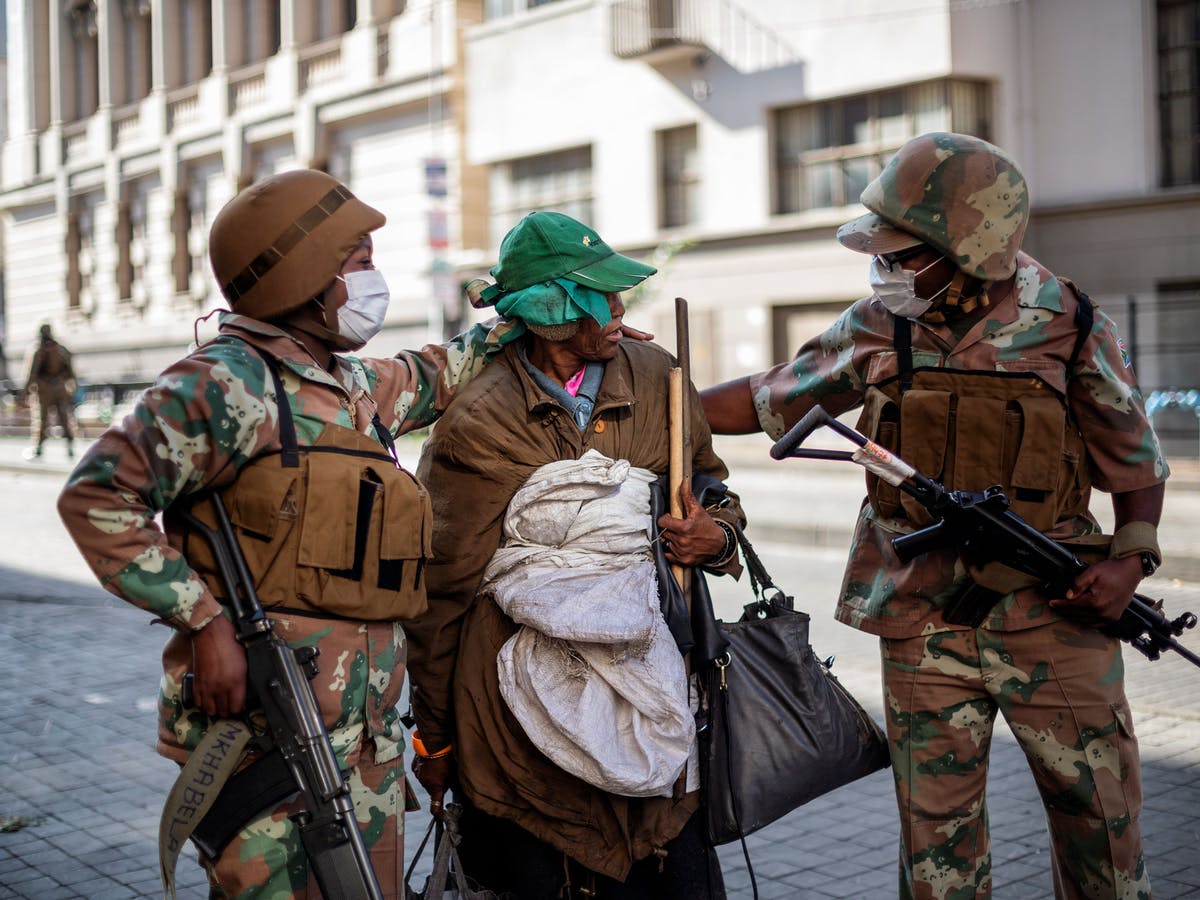
Opinion
Covid-19 regulations, a harbinger for shrinking human rights, democracy
Published
3 years agoon
By
NewsHawksIT has been a long six months since the world was forced to adopt a new normal after the novel coronavirus forced the world to impose into lockdowns, shutting national and international borders and literally grinding the economic wheels to a halt.
The global death toll continues to rise though there are hopeful signs that southern Africa is well past the peak. This paper will highlight some of the challenges that the region has faced as a result of this global scourge.
The presentation focuses on how the Covid-19 pandemic has impacted on democracy and human rights, by critically analysing the measures adopted by governments to ostensibly manage the health emergency. As countries emerge from the shadows of this very difficult chapter, it is imperative to analyse how governments in southern Africa behaved when the world was not watching.
A socio-economic crisis of global proportions
On 11 March 2020, the World Health Organisation (WHO) declared Covid-19 a global pandemic. In response, authorities in the region declared states of emergency and disaster or issued other public measures to curb the spread of the disease. While these measures may have been necessary, concerns were raised over the incompatibility of the lockdown requirements with the ability of the generality of the population to sustain themselves and their families.
The lockdown measures threatened hunger and starvation for millions of people. Regrettably, except for South Africa, the limited measures implemented across the region to alleviate the economic damage targeted the formal economy, neglecting the informal and communal economies where the majority of people, particularly women, are located.
Authorities in the region, to a larger extent, failed to respond sufficiently to the region’s high level of poverty, unemployment, inequality and the need for social safety nets. Such was the scale of concern about the impact of the Covid-19 measures on the poor that on 23 April 2020, the African Commission on Human and People’s Rights expressed concern “about the precarious conditions … constituting a real risk for the spread of Covid-19”.
Over the years, the informal economy in southern Africa has grown to unprecedented levels. For some of those who were in employment, thousands of jobs were lost every day as small-to-medium enterprises and some big companies started reeling as a result of stagnant economic activity. As people continued to lose jobs and income, without a way of knowing when normalcy would return, hunger and starvation settling in people’s homes and rowdy scenes of people scrambling for food became the new norm.
In May 2020, the International Labour Organisation revealed that businesses across a range of economic sectors were facing catastrophic losses, which threatened their operations and solvency, especially among smaller enterprises, while millions of workers became vulnerable to income loss and layoffs. The impact on income-generating activities was especially harsh for unprotected workers and the most vulnerable groups in the informal economy.
The World Food Programme (WFP) had already warned that the world was on the brink of a hunger pandemic. David Beasley, head of the WFP, reported that 135 million people were facing acute food shortages globally and that the coronavirus pandemic could increase this by another 130 million by year-end.
The world faces “multiple famines of biblical proportions” that could result in 300,000 deaths per day – a “hunger pandemic”, he said. Estimates by the International Food Policy Research Institute (IFPRI) indicated that a possible global gross domestic product (GDP) loss of 5% in 2020 could increase worldwide poverty levels by 20%, pushing another 147 million people into extreme poverty, and more than half of those at risk – 79 million people – would be in sub-Saharan Africa.
Hunger pains grow across southern Africa
The immediate reality for many in Africa was that despite the health crisis posed by the pandemic, hunger and poverty remained, as probably, the most devastating threat due to pre-existing economic conditions. Several countries approached multilateral lenders, including the World Bank, the International Monetary Fund (IMF) as well as the African Development Bank for emergency financial assistance.
These include Lesotho, South Africa, Namibia, Zambia and Zimbabwe. In an unusual turn of events, on 2 April 2020, Zimbabwe’s finance minister Mthuli Ncube wrote to the IMF and other leading multilateral lenders, not only pleading for financial assistance but admitting to policy errors and pledging to address the issue of electoral reforms, among other issues previously raised by the international community, for the organisations to agree to reschedule the payment of arrears and allow Zimbabwe to access fresh finance that is needed for the creation of a social safety net.
Zimbabwe, with an unemployment rate of over 90%, has the second-largest informal economy in the world after Bolivia. Before the pandemic, the country was already battling a severe socio-economic crisis spanning two decades. Many observers raised concern that measures to curb the Covid-19 would hit the most vulnerable people hard.
The Zimbabwe National Chamber of Commerce (ZNCC) estimated that 25% of the country’s formal jobs and 75% of informal jobs were at risk from Covid-19 containment measures. This came in the wake of a report that was issued by the WFP in December 2019 advising that the country was facing its worst hunger crisis in 10 years, with 7,7 million people food insecure. In a country where half the population was already struggling to eat daily, and maize prices rose by a third in February 2020, the situation was dire.
A significant population lives from hand to mouth, with limited access to basic needs such as food, water, clothing and shelter. Social services, particularly healthcare and education, are beyond the reach of many. Many rely on support from relatives, families and friends in the diaspora who have fled the same miserable economic conditions.
However, accessing Zimbabwe diaspora remittances has been a nightmare and is worsened by the non-availability of cash from outlets. Parallel market money traders who operate the streets of Bulawayo, Harare and Mutare reportedly resorted to working from home, as they could not afford to abide by lockdown restrictions, so desperate customers would time and again call them on their mobile phones. Since the government introduced lockdown measures, many lost their sources of income and depended on food aid.
NewsDay reported that close to 400 sex workers in Marondera were struggling to survive owing to lockdown restrictions, particularly physical distancing. Life Health Education Development director Primrose Fundai, whose organisation works with commercial sex workers, reported that sex workers had been greatly affected by the requirement to observe physical distancing. Some needed to collect their medication for chronic conditions during the lockdown but did not have written letters to permit them to travel.
The ruling Zanu PF was also accused of using food to shore up support, especially in rural areas. The Zimbabwe NGO Forum reported that cases of partisan distribution of food aid were on the rise countrywide. In Sakubva, Mutare, community members reported that government food aid distribution in the area was being conducted on a partisan basis.
On 12 April, about 200 people were allegedly summoned by the Zanu PF Manicaland youth assembly at Sakubva Beit Hall to draw up a list of food beneficiaries, deliberately excluding those who are not aligned to the party. Similar reports were recorded in Beitbridge, Matabeleland province. The Zimbabwe Peace Project stated in their monthly report in April 2020, that the government “announced it would disburse US$600 million to a million vulnerable households and the money (about $200 per family (equivalent to US$5 per month) was to be disbursed through the Department of Social Welfare, which was to assess vulnerability and compile a list of deserving families”.
In Angola, reports of partisan distribution of food aid also emerged after the government announced relief measures to cover businesses, informal sector workers and families affected by the lockdown regulations. Distribution of food rations such as maize, rice, pasta, sugar and cooking oil were rolled out after the government announced a nationwide relief of over US$550 000 through the Ministry of Social Action, Family and Women’s Promotion.
Civil society organisations raised concern about the lack of transparency in food distribution following government relief assistance. Families in the Luanda and Benguela provinces reportedly complained that they were not properly informed about who qualified to receive food aid or how the government made decisions on who would receive the relief in communities.
In Mozambique, on 6 May, the Forum De Monitoria Do Orcamento (FMO) met with the IMF in light of the US$309 million emergency fund that was allocated to that country to guarantee social protection and strengthen the capacity of the health sector to address the Covid-19 pandemic. FMO called on the IMF to incorporate principles of transparency and good governance in the management of the funds and ensure the involvement of civil society as an independent monitoring mechanism, given the history of corruption and diversion of government funds by the ruling elite with impunity.
In Malawi, efforts to lockdown by the then embattled President Peter Mutharika were suspended after High Court Judge Justice Kenyatta Nyirenda ruled against it. Malawi’s High Court temporarily halted the government’s 21-day lockdown pending a judicial review. The government was ordered to put in place necessary socioeconomic protection measures to prevent harm to the poorest and most vulnerable of society.
In response, the government reportedly introduced a US$51 million emergency crash programme to mitigate the impact of the Covid-19 pandemic on vulnerable groups for six months from May to October. More than 172 000 households in the cities of Lilongwe, Blantyre, Mzuzu and Zomba were expected to benefit from the programme.
Other measures included a reduction of fuel prices, waiver on fees on electronic payments and a moratorium on bank loan repayments. Data shows that more than 70% of the country’s population lives below the poverty datum line.
South Africa, ranked one of the most unequal countries in the world by the World Bank, had a 29% unemployment rate before the lockdown. Even among the employed, 18% of three million people work in the informal sector. According to Africa economist Boingotlo Gasealahwe: “South Africa implemented some of the most draconian containment measures in the world. This has come at a huge cost to the economy.
Even though the most stringent containment measures were being eased by the beginning of May, large parts of the economy remained closed. This together with the limited direct fiscal policy support means that the economy will continue to haemorrhage. The cumulative damage will depend crucially on the length of the lockdown.” Food became scarce, resulting in rampant looting of grocery shops and supermarkets in South Africa’s townships.
On 16 April, IOL reported that 11 people had been arrested for burglary and looting of grocery stores at Cape Flats in Cape Town amid lockdown. News24 reported similar incidents, where a Shoprite outlet in Gatesville, Athlone, Cape Town was looted by 16 suspects who fled with tills, cash and groceries. In Manenberg, about 5km away, large crowds also took to the streets and broke into two wholesalers, “helping themselves to grocery items”.
On 29 April 2020, people were shocked when The Daily Telegraph broadcast a video of poor people queuing for food parcels in Centurion in winding queues of over 4km just to receive food that would last less than two days. Various private businesses donated 8 000 food hampers, which were distributed in the informal settlement of Mooiplaas in Centurion.
On 19 April, City Press reported that incidents of corruption and food aid looting had been reported in eight provinces, where there were claims that those in charge of the distributions mostly African National Congress (ANC) councillors were not giving the food to the families that were most in need.
The councillors were accused of nepotism and unfair discrimination when distributing food parcels and other Covid-19 related essentials in North West, Mpumalanga, Limpopo, Gauteng, KwaZulu-Natal, Eastern Cape and Northern Cape provinces.
Allegations of partisan distribution of food were reported across the whole southern African region, prompting Deprose Muchena, Amnesty International director for East and Southern Africa, to warn that: “The distribution of food aid along party political lines is completely unacceptable and it is undermining the protection measures that governments have committed to implement to uphold the right to food for everyone.”
Therefore, across Southern Africa, the requirement of physical distancing proved to be a tall order if not impossible in extremely poor communities, with no adequate housing in all high-population density locations in cities. Almost business-as-usual movement of people as they scrambled for basics such as food for survival remained common in Angola, Zambia, Malawi, Mozambique, South Africa, Zimbabwe, Namibia and Botswana.
In Mozambique, for example, the townships of Chamanculo, Mafalala, Polana Canico, Maxquane and Hulene in Maputo; Manga, Munhava, Goto and Nhamudima in Beira proved near impossible to impose physical distancing due to overcrowding and limited accommodation.
The other incompatibility with physical distancing was that communities in all these southern African cities have to scramble for food daily, making it difficult for them to remain indoors. In Mutare, Zimbabwe, armed police reportedly burnt huge quantities of food confiscated from vendors at Sakubva vegetable market under the guise of imposing lockdown measures.
Across Southern Africa, lockdown measures exposed grave inequalities in societies with a disproportionate impact on the poor and economically vulnerable.
The precarious conditions in which millions of ordinary people the unemployed, women vendors and informal traders live without adequate food, clean drinking water, decent housing and toilets and jobs did not only increase the risk for the spread of Covid-19 but also increased the dangers of facing State security agents brutality, given that many governments deployed the army to help the police enforce the lockdown measures.
Unfortunately, the lockdown regulations also threw millions of more people, who usually survive on hand-to-mouth jobs, into extreme poverty as they could not fend for themselves. The fragile nature of the majority of livelihoods and the absence of government measures such as social safety nets to cushion poor people also produced this unintended consequence. The stay-at-home orders were imposed on a population that could ill afford and were ill-prepared to stay at home. Fighting Covid-19 without water.
At the centre of expert advice to combat, the spread of Covid-19 was basic hygiene, but the requirement to regularly wash hands was also near impossible to achieve because of the absence of clean and potable water in many urban centres in southern Africa. In Zimbabwe’s sprawling capital Harare alone, one million people have no access to water, a basic human right.
Crowds of more than 50 people would be seen gathered at community boreholes and water points to fetch water at the peak of the pandemic. The absence of water resulted in Zimbabwe Lawyers for Human Rights (ZLHR) mounting a series of public interest litigation cases in different provinces to compel the authorities to supply water to the people during the lockdown.
The 2013 Constitution of Zimbabwe guarantees the right to safe and potable water for everyone, and this is the first time that the lawyers have made a concerted effort to assert such rights in Zimbabwe. As a result, on 7 April 2020 in the Mutare High Court, judge Justice Hlekani Mwayera ordered the City of Mutare and the government of Zimbabwe to provide safe and potable water for residents of Dangamvura on schedules published and accessible to the public.
The case was brought by Ephraim Matanda and United Mutare Residents and Ratepayers Trust against the City of Mutare and the Ministry of Local Government and argued by human rights lawyers Passmore Nyakureba and Kelvin Kabaya.
In Luanda, Angola, crowds continued to make their way to markets, shops and water points despite the lockdown regulations, arguing that “it is better to die of this disease or a gunshot than to starve to death”, evidence that physical distancing as a measure was near impossible in relation to people’s daily struggles. While expected to stay at home, people were forced to defy lockdown regulations owing to the erratic supply of water.
South Africa should be applauded for availing R20 billion to municipalities tasked with the provision of emergency water supply, increased sanitation of public transport and facilities, and providing food and shelter for the homeless.
Over the past decade, civic and democratic space has been invariably shrinking in Southern Africa. Reports confirm a recent acceleration of the trend of “closing” or “shrinking” civic space, triggered by both State and non-State actors through legal means like repressive laws as well as through para-legal tactics such as intimidation, harassment, abductions, forced disappearances and killings. This has particularly targeted progressive civil society organisations
Conclusion
When the Covid-19 pandemic emerged as a serious threat to human health and economic systems at the start of 2020, many countries across the globe summoned their abilities to focus on the twin threats. In Southern Africa, however, it seems to have been an opportunity for illiberal governments to consolidate political hegemony, curtail citizen rights and in some cases financially profiteer from the crisis.
Not only did this weaken the fight against the pandemic, but also pegged back by very significant margins, the hard-won progress that had hitherto been made in the painstaking democratisation process. It is unimaginably tragic that for most leaders in the region, the pandemic was “too good a crisis to waste!”
About the writer: Tatenda Mazarura is a women human rights defender. This article is an extract from a longer paper by the Crisis in Zimbabwe Coalition titled Whither Democracy and Human Rights in Sadc: Lockdowns and Basic Human Rights.
You may like

